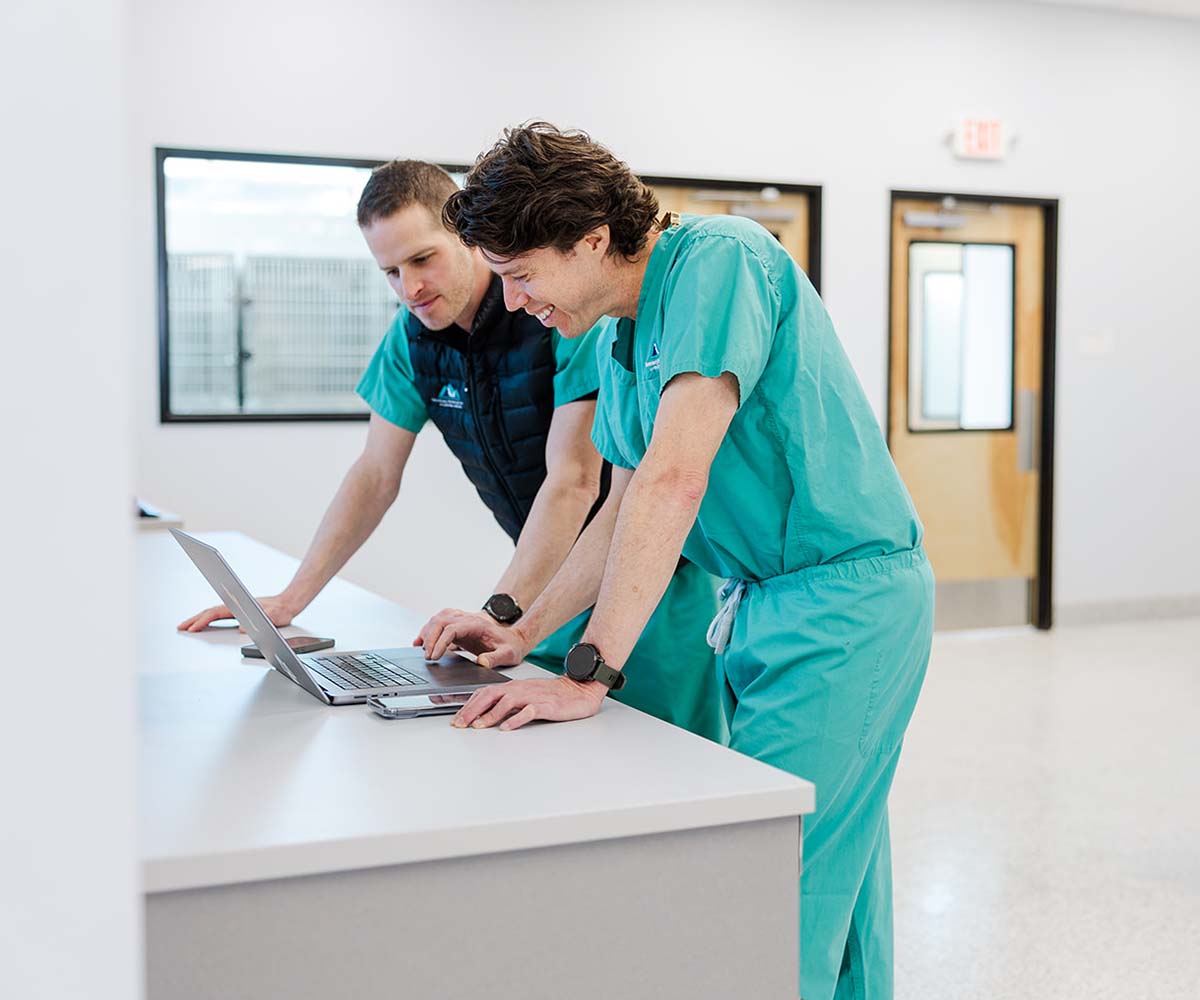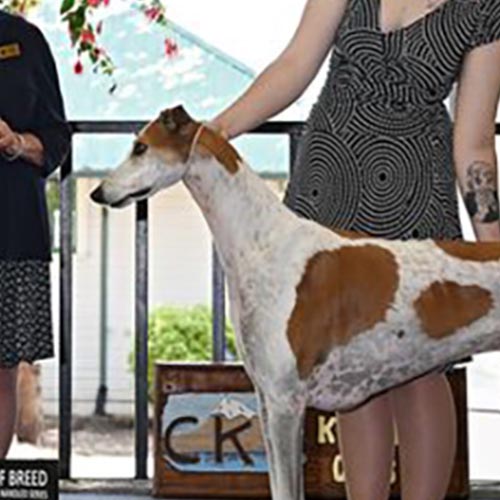When surgery is recommended for your pet, you want to know they are in the best hands, from the operating room to the recovery room.
Our board-certified surgeons perform orthopedic, soft tissue, oncologic, emergency, and neuro-surgery. They work with our team of highly-trained technicians and staff to help your pet make a seamless and comfortable transition to recovery.
VRCCO Surgery
62889 NE Oxford Ct.
Bend, Oregon 97701
541-209-6960
Directions
Common Surgeries
VRCCO is equipped to handle even the most complex cases. With our advanced diagnostic tools, we can deliver the best treatment options for your pet.
Let’s face it, our pets love to chew and graze on objects around their world. In certain instances, pets can develop a gastrointestinal obstruction from a foreign object that requires surgery to remove the object and repair the bowel. We also perform gastrointestinal surgery to obtain biopsies for inflammatory bowel disease and to remove gastrointestinal tumors. We often utilize radiographs and abdominal ultrasound to help pinpoint the exact cause of intestinal disease prior to embarking on a surgical procedure.
Surgery involving the chest cavity can be some of the most complex. Surgery could involve the lungs (infection, trauma, neoplasia), pericardium (lining of the heart) or operating on some of the great vessels of the heart (typically due to congenital malformations). Preoperative planning with thoracic ultrasound and/or CT scan helps to make an accurate diagnosis prior to performing thoracic surgery. Surgery is typically performed via an open “thoracotomy” but can also be performed in a minimally invasive fashion with thoracoscopy in select cases.
As surgery has evolved on both the human and veterinary side of medicine, we have strived to make surgery as accurate and pain-free as possible. By utilizing very specialized high definition cameras and fine instruments, we can perform multiple different surgeries through small incisions (5-10mm) that avoid a large open incision site. These advancements help make the recovery for your pet as comfortable as possible. At this time, we are able to perform laparoscopic ovariectomies, gastropexies, cryptorchid testicle removals, vasectomies, cholecystectomies, liver biopsies, and adrenal tumor removals.
There are a wide variety of surgical procedures performed under emergency circumstances. Finding yourself faced with emergency surgery for your pet is stressful. Whether it is a foreign body removal, bleeding mass in the abdomen, treatment for GDV (Gastric Dilatation Volvulus, also known as “bloat”), or trauma repair, you can be confident that your pet is in good hands and will receive the best care possible.
Mass removals can be a very straightforward procedure, but they can also be highly complex. The location, size, and nature of the mass determine the complexity of the procedure and the overall outcome. For example, a golf ball-sized fatty tumor located just under the surface of the skin on a dog’s abdomen would typically be much easier to remove than a friable, walnut-sized mass interwoven around an internal organ that sits right next to a major blood vessel. For more complex cases, CT scanning allows us to more critically evaluate the extent of the mass and create an appropriate surgical plan.
Please see our Bone, Joint and Spine Center
WHAT TO EXPECT
Before, During & After Surgery

Each patient will undergo preoperative diagnostics specific to the procedure being performed. The most common diagnostics are blood work, x-rays, abdominal ultrasonography or CT scanning. These diagnostics allow the surgical team to make an individualized surgical plan for your pet. Your pet will receive appropriate pain control before, during, and after surgery. Click here to learn more about pain management.
A question that we are often asked regarding patients scheduled for surgery is: “Will my pet be receiving any pain medication?” The short answer is an emphatic, yes!
We take pain management very seriously at the Veterinary Referral Center of Central Oregon. Regardless of the reason your pet is with us, such as an emergency visit after a traumatic injury or a planned surgery, appropriate pain management is of paramount importance to us. Any patient that undergoes any type of surgical procedure will receive pain control before, during, and after surgery. We implement a variety of progressive anesthetic and pain management techniques, commonly referred to as a “multimodal anesthetic approach.” This means that we use a combination of pain control techniques, specific to each patient with the goal of providing pain control and minimizing side effects commonly associated with pain medications, such as dysphoria and nausea.
First and foremost, since our pets can’t speak up when they are hurting, veterinary professionals need to be able to read body language and interpret vitals signs for varying species. Even a pet’s personality must be considered when assessing pain. The staff at VRCCO are all thoroughly trained to accurately assess pain on all pets we treat.
Before surgery, each patient receives injectable pain medication. These injections last anywhere from 2-6 hours, depending on which medication is used. Depending on the procedure, patients may also receive an epidural or a local nerve block. These types of pain management provide an additional 4-24 hours of pain control, specific to the region being operated on. We have integrated a long-acting local anesthetic that provides up to 72 hours of postoperative pain management for many of our surgery cases.
Our standard is for any patient that has undergone a major surgical procedure to stay at least one night with us. These patients are kept on intravenous fluids and benefit from intravenous pain management. Most commonly, we control pain through CRI’s – constant rate of infusions. This means that patients are continuously receiving pain medication that is dosed specific to their weight and their individual response to the pain mediation. Dosages for constant rate of infusions are easily adjusted, depending on the patient’s pain levels. CRI’s may be started before, during, or immediately after surgery.
Typically once a patient is eating, we will begin to transition them from intravenous medications to oral medications. Oral medications may include opioids, NSAIDS (non-steroidal anti-inflammatories), or medications for nerve pain. Depending on the procedure, oral pain medication may be prescribed for a few days or a few weeks.
Rest assured that your patient’s comfort is a priority at VRCCO! We will do everything in our power to keep your pet pain free following their procedure.
We use advanced equipment to monitor heart rate, respiratory rate, body temperature, blood pressure, heart rhythm, carbon dioxide levels, and sometimes even blood gasses. Your pet will be closely monitored until they are fully recovered from the anesthetic event. Additional precautions are always taken when performing anesthesia on inherently higher risk patients such as brachycephalic breeds.
Prior to surgery, an IV catheter and endotracheal tube will be placed, IV fluids started, and anesthesia will begin. The surgical area is then clipped and cleaned. While under anesthesia, your pet will be closely monitored by an experienced veterinary nurse anesthetist who will work with the team to ensure a comfortable and uneventful anesthetic event.
Appropriate pain management is critical before, during and after surgery. We provide a variety of progressive anesthetic and pain management techniques, known as “multimodal anesthesia,” including:
• Continuous infusions of pain medications
• Local nerve blocks
• Epidurals
• Oral medications
• Long acting local anesthesia
All surgical patients will receive overnight, post-operative monitoring by a skilled veterinary staff with doctors in the hospital 24 hours a day. Most patients are ready to go home the next day.
A treatment plan will be provided for any recommended diagnostics and/or treatments. An initial payment will be required for any procedure, surgery, or diagnostic work-up over $600. We gladly partner with CareCredit and Scratchpay to offer financing services to our clients. Please ask our team for more details. We are also happy to assist with submission of pet insurance claims to your pet’s insurance provider. We provide a 10% discount for pet parents in military service.
We accept cash, VISA, Mastercard, Discover, CareCredit and Scratchpay. Personal checks and American Express are not accepted.
Surgery Team
Every member of our surgery team is board certified, best in class, and dedicated to you and your pet.
Dr. Mauricio Dujowich
DVM, DACVS SURGERY, CCRT
Dr. Stephen Stockdale
DVM, DACVS SURGERY
Dr. Jim Perry
DVM, PHD, DACVIM-O, DACVS SURGERY
Dr. Colin Taylor
DVM, MSC, BS, DACVS SURGERY
Dr. Ali Majer
DVM, SURGERY RESIDENT

Pet Hero Story
VRCCO Saved Percy
“Shout out to the great staff, techs, and doctors at VRCCO who saved our Greyhound Percy who had a middle-of-the-night presentation of GDV on a holiday weekend while we were far from home while attending dog shows in Redmond. Everyone did exactly the right things with all necessary haste. Percy is a week and a half out from his surgery and the worst consequence of his ordeal is keeping him away from his itchy sutures. We are grateful beyond words. Thank you!” – Valarie King
VRCCO Surgery is located in our Emergency and Specialty Hospital. To learn more or schedule an appointment call 541-209-6960 or email us at info@vrcvet.com
VRCCO Surgery
62889 NE Oxford Ct.
Bend, Oregon 97701
541-209-6960




